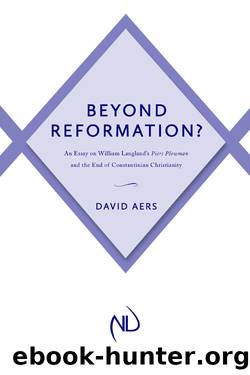Beyond Reformation? by Aers David;

Author:Aers, David; [Aers, David]
Language: eng
Format: epub
Tags: REL013000 Religion / Christianity / Literature & the Arts
ISBN: 4451825
Publisher: University of Notre Dame Press
Published: 2015-10-18T16:00:00+00:00
That was a way of putting it—not very satisfactory:
A periphrastic study in a worn-out poetical fashion,
Leaving one still with the intolerable wrestle
With words and meanings.
(East Coker, pt. 2, in Four Quartets)
But because this is one of the passages that has elicited most discussion among those seeking to draw the poet into affinity with Joachite prophecy and millenarianism, I will add a few more observations on it. Because the question concerns the kind of reformist Langland was, it belongs to the present study. As I have made clear in my discussion, placing that in the context of Joachite prophecy, Conscience is made to exhibit a millenarian vision that could have been stimulated by Joachite traditions, although non-Joachite apocalypticism was hardly rare in the later Middle Ages.257 But this passage belongs to a dialectical process in which it is an exploratory moment, criticized and superseded. Its grounding in wrath at the resistance to his project of reform has been made clear, nicely symptomatized in the identification with Samuel chopping the enemy Agag into pieces. His apocalyptic mode generates the anti-Augustinian version of the millennium as an imminent eschatological peace within history, one governed by the kind of world emperor (“o cristene kyng”) whom Jean de Roquetaillade expected to come from his own nation, the French.258 The promise of such a Christian ruler dissolves the Christocentric liturgical context of Isaiah 2:2–5 (the first week of Advent), as does the retention of the death penalty for those deemed to transgress peace, including priests who go hawking or hunting.259 The millennial eschatology here is actually shown to have displaced the Word made flesh, crucified and resurrected. It has displaced the work of Christ and the distinctly Christian virtues flowing from that work. However remote Joachim’s eschatology may have been from versions cultivated by his admirers such as Gerardo of Borgo San Domino or Jean de Roquetaillade, it compromised, in the words of Henri de Lubac, “la pleine suffisance de Jésus-Christ.”260 It is such tendencies in medieval eschatology that Langland is exploring in Conscience’s oration. By ascribing it to Conscience, he associates this millenarianism with a reforming zeal whose longings and frustrations are part of Piers Plowman. But as we have already seen, and as St. Thomas so carefully taught, Conscience is not infallible, and here he errs both in his version of the millennium and, especially, in the displacement of Christology I have just identified. This displacement will be beautifully corrected, at length, from Passus XVIII to XXI.
There is just one more observation I want to make about Conscience’s millenarian fable. It is derived from that teacher we met misleading him in Passus XXI: Kynde Wit. He declares: “I, Conscience, knowe this, for Kynde Wit me tauhte” (III.437; cf. XXI.360). Kynde Wit has taught him to expect a millennium in which Reason (his colleague in Passus IV and V) will govern the polity (III.437–42). I have already discussed some ecclesial errors into which Kynde Wit will lead Conscience much later. There I focused on the
Download
This site does not store any files on its server. We only index and link to content provided by other sites. Please contact the content providers to delete copyright contents if any and email us, we'll remove relevant links or contents immediately.
| Ancient & Classical | Arthurian Romance |
| Beat Generation | Feminist |
| Gothic & Romantic | LGBT |
| Medieval | Modern |
| Modernism | Postmodernism |
| Renaissance | Shakespeare |
| Surrealism | Victorian |
4 3 2 1: A Novel by Paul Auster(11113)
The handmaid's tale by Margaret Atwood(6912)
Giovanni's Room by James Baldwin(5962)
Big Magic: Creative Living Beyond Fear by Elizabeth Gilbert(4779)
Asking the Right Questions: A Guide to Critical Thinking by M. Neil Browne & Stuart M. Keeley(4639)
On Writing A Memoir of the Craft by Stephen King(4261)
Ego Is the Enemy by Ryan Holiday(4042)
Ken Follett - World without end by Ken Follett(4000)
The Body: A Guide for Occupants by Bill Bryson(3882)
Bluets by Maggie Nelson(3759)
Adulting by Kelly Williams Brown(3716)
Guilty Pleasures by Laurell K Hamilton(3629)
Eat That Frog! by Brian Tracy(3562)
White Noise - A Novel by Don DeLillo(3464)
The Poetry of Pablo Neruda by Pablo Neruda(3405)
Alive: The Story of the Andes Survivors by Piers Paul Read(3346)
The Book of Joy by Dalai Lama(3274)
The Bookshop by Penelope Fitzgerald(3260)
Fingerprints of the Gods by Graham Hancock(3254)
